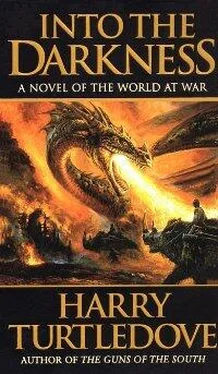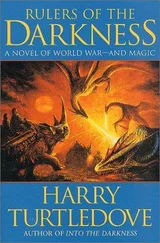Krasta laughed. She almost changed her mind. But she still had gold in her handbag, and plenty of shops along the Avenue of Equestrians she hadn’t seen. She paid for her luncheon and left the Bronze Woodcock. Valnu blew her a kiss.
Skarnu stared in grim dismay at the line of fortresses ahead. Having seen them, the Valmieran captain no longer wondered why his superiors hesitated before hurling their army at those works. The Algarvians had lavished both ingenuity and gold on them. Whoever tried to smash them down, whoever tried to break through them, would pay dearly.
“Come away, Captain,” Sergeant Raunu urged. “Like as not, the stinking Algarvians’ll put a hole through anybody who takes too long a look.”
“Like as not, you’re right,” Skarnu said, and ducked back down into the barley that helped shield him from unfriendly eyes—and, east of where he crouched, there were no eyes of any other sort. East of where he crouched, too, were very few places to hide. Whatever else might happen to it, the Algarvians’ defensive line would not fall to surprise attack.
“In the last war, we’d throw eggs at forts and then just charge right at ’em,” Raunu said. “Maybe they’ve learned something since.”
“If they’d learned anything since, we wouldn’t be in a war now,” Skarnu answered. The veteran sergeant blinked, then slowly nodded.
Off to the north, Valmieran egg-tossers started lobbing destruction at the line of forts. The burst resounded like distant thunder. Skarnu wondered how much damage they were doing. Not so much as he would have liked: he was certain of that. The Algarvians had used stone and earth and cement and iron and bronze to fashion a line of death that ran for many miles north and south and was most of a mile deep. How long would soldiers batter their heads against that line, as Raunu had said, in search of a breakthrough that might not be there at all? Forever?
Probably not. Even so, Skarnu sighed as he said, “They built that to dare us to try to go through it, to dare us to spend the men we’d need to get to the other side. They don’t think we have the nerve to do it.”
“I wouldn’t be sorry if they were right, either,” Raunu said.
“Would you rather fight inside Valmiera, the way we did for most of the Six Years’ War?” Skarnu returned.
“Sir, it’s like you said: if you ask me what I’d rather, I’d rather not fight at all,” the sergeant said.
Skarnu clicked his tongue between his teeth. Sergeant Raunu had indeed used his own words to reply to him, which meant he could hardly take exception to what the veteran said. But he’d seen that a good many of the common soldiers had little stomach for the fight against Algarve in general, and even less for the assault on the forts. He said, “We should have pushed harder, so we would have been through this line before the Forthwegians collapsed.”
“Aye, I see what you’re saying, sir, but I don’t know how much difference that would have made.” Raunu pointed ahead. “Doesn’t look like the cursed redheads have put any new men in their lines, even if they don’t have to worry about their western front any more.”
“They don’t have to worry about Forthweg any more,” Skarnu corrected. “Now they’re face to face with Unkerlant. If they’re not worried about that, they’re fools.”
“Of course they’re fools. They’re Algarvians.” Raunu spoke with an automatic scorn Skarnu’s sister Krasta might have envied. But then, as Krasta would never have done, he changed course slightly: “They’re fools most ways, I mean. They make good soldiers, whatever else you say about ’em.”
“I wish I could tell you you were wrong,” Skarnu said. “Our lives would be easier.” The Algarvians had resisted the Valmieran advance to the fortified line with only light forces, but they’d fought stubbornly. They’d also fought skillfully, perhaps more skillfully than the men he commanded. Had there been more of them, he wondered if his men would have been able to advance at all. Along with most of his other worries, he kept that one to himself.
A runner came up to him. “My lord marquis?” the fellow asked.
“Aye?” Skarnu said in some small surprise. Far more often these days, he was addressed by his military rank, not title. After a moment, a possible reason for this exception came to mind.
And, sure enough, the runner said, “My lord, his Grace the Duke of Klaipeda bids you sup with him and with some of the other leading officers of our triumphant army at his headquarters this evening. The supper shall begin an hour past sunset.”
“Please tell his Grace I am honored, and of course I shall attend him,” Skarnu answered. The runner bowed and hurried away.
Raunu eyed Skarnu. He’d understood Skarnu was a noble, of course. That was one thing. An invitation extended to a captain to sup with the commander of an army of tens of thousands was something else again. Almost defensively, Skarnu said, “I went to school with his Grace’s son.”
“Did you, sir?” the sergeant said. “Well, you’ll get a good meal out of it, and that’s the truth. I will say, though, sir, the men think well of you for eating out of the same pot they use.”
“It’s the best way I could think of to make sure they got decent food,” Skarnu said. “Nobody cares when a common soldier fusses and complains. When a captain grumbles, though, people start to notice.”
“Aye, sir,” Raunu said, “especially when he’s a captain who went to school with the Duke of Klaipeda’s son.” More than half to himself, he added, “It’s a wonder you’re just a captain and not a colonel.”
Skarnu wished he hadn’t had to mention his connection with the duke, whose son, while not the depraved little monster so beloved of romancers without much imagination, had been one of the most boring youths he’d ever met. He also wished the duke were paying more attention to the commanders who would lead great parts of the Valmieran army into battle and less to his son’s social connections.
But, regardless of the duke’s shortcomings, Skarnu spruced himself up and made his way back toward the village of Bonorva. The village was a good deal more battered than it had been when he’d first seen it from the woods that now lay on the far side from the front. The duke had taken up residence in one of the larger houses there. It still looked scarred and abused: no point cleaning it up and offering the Algarvians a target. Skarnu chuckled as he drew near. After he wrote to Krasta, she’d be sick with jealousy at the exalted company he was keeping.
When he went inside the unprepossessing building, Skarnu might have been transported to another world, the world in which the Valmieran nobility had idled away its time in Priekule and on estates out in the provinces. Lights blazed; dark cloth over the windows and behind the door kept it from leaking out and drawing the notice of Algarvian dragons overhead or the cunning snoops who kept trying to spy targets for the enemy’s egg-tossers.
Marstalu, the Duke of Klaipeda, stood just inside the doorway greeting new arrivals. He was a portly man in his late fifties, his complexion very pink, his hair gone white as snow: he looked like everyone’s favorite grandfather. His uniform put Skarnu in mind of those the Kaunian Emperors had won. So did the brilliant constellation of medals—some gold, some silver, some bejeweled, some with ribbons like comets’ tails—spangling his chest.
Skarnu bowed low, murmuring, “Your Grace.”
“Good to see you, lad. Good to see you,” the duke said, beaming in a grandfatherly way. “Make yourself at home. Plenty of good things to eat and drink here—better than you’ll find at the front, that’s certain.”
“No doubt, sir.” Skarnu felt out of place here despite Marstalu’s friendly words. Most of the other noble officers present glittered hardly less than their commanders. Skarnu’s unadorned uniform made him look and feel like a servant. It also made him feel like a real soldier in amongst a flock of popinjays. Perhaps that was what made him ask, “Sir, when will the attack against the Algarvian works go in?”
Читать дальше












